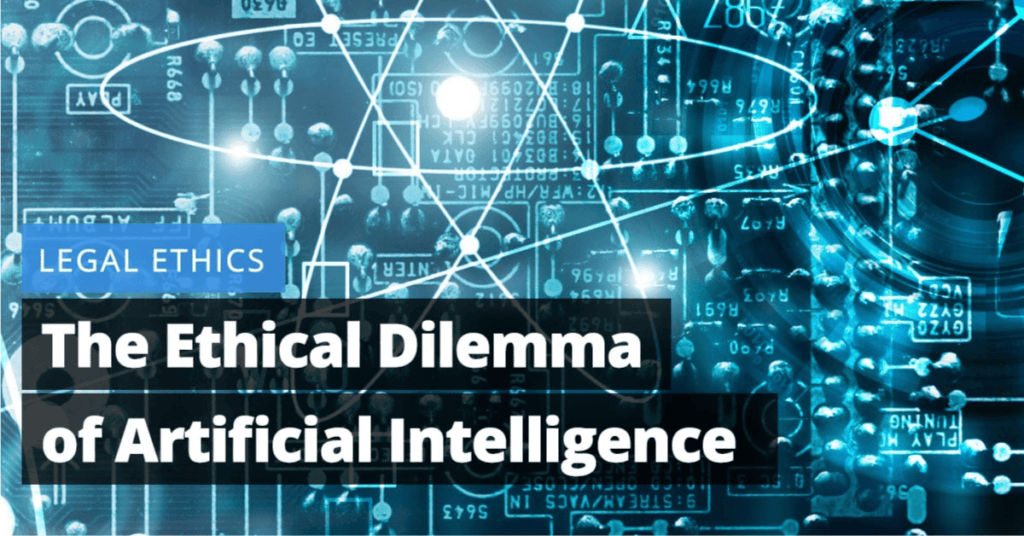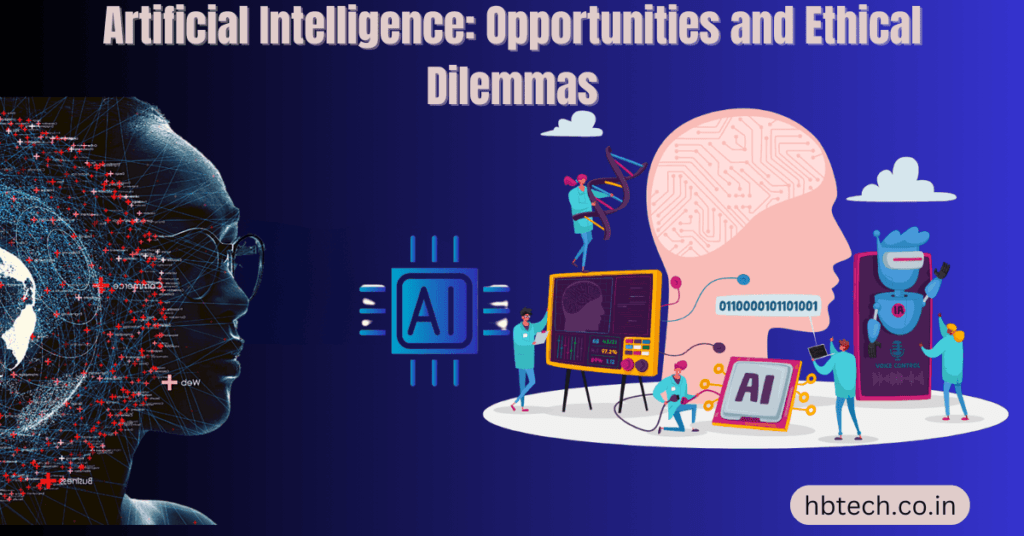Artificial Intelligence (AI) is changing the world in incredible ways. It opens up many opportunities while also bringing up some serious ethical questions. As more industries use AI to innovate and improve, it’s important to understand both the potential benefits and the ethical issues that come with it.

Opportunities Offered by Artificial Intelligence
AI is a game-changer across many industries. Here are some of the key benefits it brings :
- Advances in Healthcare AI is helping doctors diagnose diseases more accurately and earlier than ever before. For example, AI tools can analyze medical scans to spot health issues that might go unnoticed by human eyes.
- Boosting Business Efficiency AI streamlines business processes, reduces errors and increases productivity. Chatbots provide customer service around the clock, while AI tools can predict market trends to help businesses make smarter decisions.
- Personalized Learning in Education In schools, AI tailors lessons to fit each student’s needs. Adaptive learning platforms adjust the content to help students learn at their own pace and improve their understanding.
- Helping the Environment AI is playing a role in tackling environmental problems. For instance, it’s used to predict weather patterns, optimize energy usage and monitor endangered species.
- Entertainment Innovations AI is enhancing creativity in movies, music and games. Streaming platforms like Netflix and Spotify use AI to recommend content tailored to individual preferences.
Ethical Challenges in Artificial Intelligence
Despite its benefits, AI raises important ethical concerns. Here are some of the main issues :
1. Bias and Fairness
AI systems often learn from historical data, which might include biases. If not addressed, these biases can lead to unfair treatment. For example, hiring algorithms have sometimes favored certain groups over others, leading to discrimination.
2. Privacy Issues
AI needs a lot of data to work effectively, but this raises privacy concerns. For instance, facial recognition systems have sparked debates about surveillance and the misuse of personal data.
3. Responsibility and Transparency
Who is responsible when an AI makes a mistake? For example, if a self-driving car causes an accident, is the blame on the manufacturer, the programmer or the car owner? Also, AI decisions can be hard to understand, creating a lack of transparency.
4. Job Losses
While AI creates new jobs, it also replaces many existing ones. Industries need to plan carefully to support workers whose jobs are affected by automation.
5. AI in Education
In education, AI raises questions about fairness. For instance, if only well-funded schools can afford advanced AI tools, it could increase the gap between wealthy and underprivileged students.
6. Legal and Ethical Questions
The laws around AI are still catching up. Issues like intellectual property rights, accountability and the use of AI in military applications need clear regulations.
Examples of Ethical Challenges in AI
Here are some real-world examples of ethical dilemmas related to AI:
- Facial Recognition : Some AI facial recognition tools have been accused of racial profiling and making inaccurate identifications.
- Deepfakes : AI can create fake videos and audio, raising concerns about misinformation and consent.
- Autonomous Weapons : The use of AI in weapons, like drones, brings up moral questions about whether machines should make life-and-death decisions.
For a deeper dive, resources like “Ethical Issues in Artificial Intelligence PDF” offer detailed case studies and frameworks to explore these challenges.
Moving Forward: Balancing Benefits and Ethics
To fully benefit from AI while addressing its ethical issues, everyone needs to work together. Developers, governments, educators and ethicists must collaborate to create guidelines that ensure fairness, accountability and transparency.
Tips for Ethical AI Development:
- Diverse Teams : Having diverse people working on AI can help reduce biases.
- Clear Data Policies : Strong rules about how data is collected and used are essential.
- Education on Ethics : Teaching AI developers about ethics can lead to more responsible innovation.
- Stronger Laws : Governments need to create clear laws to address ethical and legal concerns about AI.
AI has the power to transform our lives, but it comes with ethical responsibilities. By tackling issues like bias, privacy and fairness in education, we can ensure AI is used for the greater good. Collaboration and proactive efforts will help us unlock AI’s potential while maintaining ethical standards.
Frequently Asked Questions(FAQs)
What are the main opportunities AI offers across different industries?
AI provides several benefits, including improving healthcare through better diagnostics, boosting business efficiency by automating tasks, personalizing education to meet students’ unique needs, helping tackle environmental issues like climate change and enhancing entertainment through tailored content recommendations.
What are the key ethical challenges in artificial intelligence?
The main ethical issues include bias and fairness in AI decision-making, privacy concerns related to data collection, lack of transparency and accountability, job displacement due to automation, inequalities in access to AI tools in education and unresolved legal questions about its use in fields like warfare.
Can you provide examples of ethical dilemmas caused by AI?
Examples include racial bias in facial recognition software, the spread of misinformation through deepfakes and the use of AI in autonomous weapons, which raises moral concerns about machines making life-and-death decisions.
What are the ethical concerns of AI in education?
AI tools in education may widen the gap between wealthy and underprivileged schools, as not all institutions can afford advanced technology. This raises questions about fairness and equal access to quality education.
How can we balance the opportunities and ethical challenges of AI?
Collaboration among developers, policymakers, educators and ethicists is essential. Strategies include creating diverse AI teams to reduce biases, implementing clear data policies, educating developers on ethical considerations and enacting stronger legal frameworks to address AI’s ethical and legal concerns.
Related Posts
- How to Build a Hyperlocal E-Commerce Platform for Small Shopkeepers & Dabbawalas: A Complete Guide
- How to Clean Your Laptop Easily
- Best Laptops for Students in 2025
- The Best Laptops for PC Gaming in 2025
- Best Phone for Mobile Gaming: A Gamer’s Guide
- Lightweight Laptops for Travel









